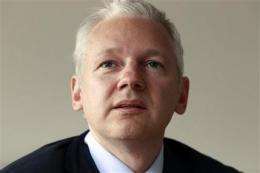WikiLeaks reveals all, media groups criticize move

(AP) -- WikiLeaks disclosed its entire archive of U.S. State Department cables Friday, much if not all of it uncensored - a move that drew stinging condemnation from major newspapers who in the past collaborated with the anti-secrecy group's efforts to expose corruption and double-dealing.
Many media outlets, including The Associated Press, previously had access to all or part of the uncensored tome. But Wikileaks' decision to post the 251,287 cables on its website makes potentially sensitive diplomatic sources available to anyone, anywhere at the stroke of a key. American officials have warned that the disclosures could jeopardize vulnerable people such as opposition figures or human rights campaigners.
A joint statement published on the Guardian's website said that the British publication and its international counterparts - The New York Times, Spanish daily El Pais and German newspaper Der Spiegel - "deplore the decision of WikiLeaks to publish the unredacted State Department cables, which may put sources at risk."
Le Monde, the French daily which also published some of WikiLeaks' documents, will join other media partners in signing the statement, according to executive editor Sylvie Kauffmann.
Previously international media outlets - and WikiLeaks itself - had redacted the names of potentially vulnerable sources, although the standard has varied and some experts warned that even people whose names had been kept out of the cables were still at risk.
But now many, and possibly even all, of the cables posted to the WikiLeaks website carried unredacted names, making it easy to identify dissidents in authoritarian countries such as Russia, China or Myanmar.
WikiLeaks staff members have not returned repeated requests for comment sent in the past two days. But in a series of messages on Twitter, the group seemed to suggest that it had no choice but to publish the archive because copies of the document were already circulating online following a security breach.
WikiLeaks has blamed the Guardian for the blunder, pointing out that a sensitive password used to decrypt the files was published in a book put out by David Leigh, one of the paper's investigative reporters and a collaborator-turned-critic of WikiLeaks founder Julian Assange.
But the Guardian, Leigh and others have rejected the claim. Although the password was in fact published in Leigh's book about seven months ago, Guardian journalists have suggested that the real problem was that WikiLeaks posted the encrypted file to the Web by accident and that Assange never bothered to change the password needed to unlock it.
In their statement, the Guardian's international partners lined up to slam the 40-year-old former computer hacker.
"We cannot defend the needless publication of the complete data - indeed, we are united in condemning it," the statement read, before adding: "The decision to publish by Julian Assange was his, and his alone."
The media organizations' rejection is a further blow to WikiLeaks, whose site is under financial embargo and whose leader remains under virtual house arrest in an English country mansion pending extradition proceedings to Sweden on unrelated sexual assault allegations.
WikiLeaks, an anti-secrecy site devoted to unveiling corruption and conspiracy, has in the past relied on mainstream partners to organize and promote its spectacular leaks of classified information - including U.S. intelligence documents detailing the wars in Iraq and Afghanistan.
Amid the latest controversy, the press freedom group Reporters Without Borders said it had temporarily suspended its WikiLeaks "mirror site." Such sites act as carbon-copies of their originals, relieving pressure due to heavy traffic and preserving data in case of attack.
In a statement, Reporters Without Borders said it had "neither the technical, human or financial resources to check each cable" for information that could harm innocent people and thus "has to play safe."
The U.S. State Department has also condemned the latest release.
©2011 The Associated Press. All rights reserved. This material may not be published, broadcast, rewritten or redistributed.





















